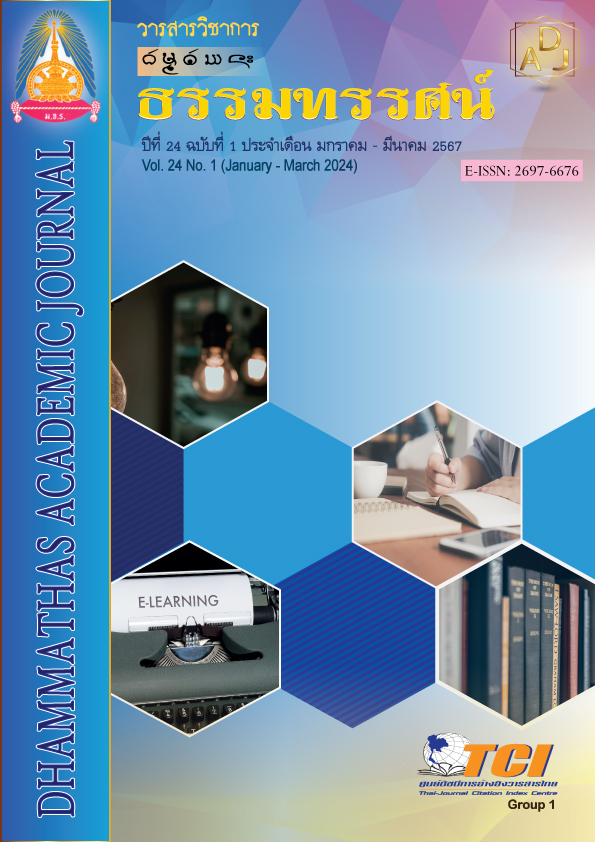Embedded Formative Assessment in Classroom using Lesson Study and Open Approach
Main Article Content
Abstract
The purpose of this research was to analyze aspects of embedded formative assessment in classrooms using lesson study and open approach. The target group in this research were student’s 5th grade in the academic year 2021, 17 students and 8 lesson study teams. Research instruments used for data analysis were 1) Field record form, learning management plan 2) Field record form, class observation using class study and open method 3) field notes, class reflections using classroom study and open methods; 4) student activity sheets and student diaries and analyzed the data according to the conceptual framework for the 21st century thinking skills assessment conceptual framework using lesson study and open approach and the Conceptual Framework for Classroom Learning Assessment.
The research results find that: Classrooms that use innovative lesson study and open approach find Assessment for Learning aspects in collaborative plan (Plan) process in the form of bringing information about students' learning in teaching design and create assessment tools by creating problem situations. including positioning to observe students' problem solving. The aspect of assessment as learning in the teaching process with an open approach (Do) is characterized by presenting problem situations that will allow students to participate in the problem situation from an angle look at yourself and take back your problems. Students will have time to solve their own problems for a period of time until they can bring their problems to the discussion and examine the ideas of themselves and their peers until they can see the similarities or differences of the concepts to bring them back to improve and develop their own ideas to be more complete. In addition, the Assessment for Learning aspect was found in the reflection process (See) in using the problem-solving data of lesson study team and the student's idea expression data to be used to improve and Develop teaching and develop lesson plans.
Article Details

This work is licensed under a Creative Commons Attribution-NonCommercial-NoDerivatives 4.0 International License.
เพื่อให้เป็นไปตามกฎหมายลิขสิทธิ์ ผู้นิพนธ์ทุกท่านต้องลงลายมือชื่อในแบบฟอร์มใบมอบลิขสิทธิ์บทความ ให้แก่วารสารฯ พร้อมกับบทความต้นฉบับที่ได้แก้ไขครั้งสุดท้าย นอกจากนี้ ผู้นิพนธ์ทุกท่านต้องยืนยันว่าบทความ ต้นฉบับที่ส่งมาตีพิมพ์นั้น ได้ส่งมาตีพิมพ์เฉพาะในวารสาร วิชาการธรรม ทรรศน์ เพียงแห่งเดียวเท่านั้น หากมีการใช้ ภาพหรือตารางของผู้นิพนธ์อื่นที่ปรากฏในสิ่งตีพิมพ์อื่นมาแล้ว ผู้นิพนธ์ต้องขออนุญาตเจ้าของลิขสิทธิ์ก่อน พร้อมทั้ง แสดงหนังสือที่ได้รับการยินยอมต่อบรรณาธิการ ก่อนที่บทความจะได้รับการตีพิมพ์References
ไมตรี อินทร์ประสิทธิ์. (2561). เอกสารประกอบการบรรยาย เรื่อง นวัตกรรมการประเมินการเรียนรู้คณิตศาสตร์ในศตวรรษที่ 21 สำหรับนักเรียนระดับประถมศึกษา และมัธยมศึกษา ในกิจกรรมอบรมหลักสูตรเพื่อการพัฒนาครูและบุคลากรทางการศึกษา สายการสอน ปี 2561. ขอนแก่น: มหาวิทยาลัยขอนแก่น.
______. (2564). การจัดการเรียนการสอนที่เน้นการพัฒนาการคิดด้วยวิธีการแบบเปิด (Open Approach). เอกสารประกอบการประชุมการเปิดชั้นเรียนระดับชาติครั้งที่ 14, 23-24 มีนาคม 2567, (หน้า 1-147). ขอนแก่น: มหาวิทยาลัยขอนแก่น.
จิตรลดา ใจกล้า. (2557). การประเมินการเรียนรู้ของนักเรียนในโรงเรียนที่ใช้นวัตกรรมการศึกษาชั้นเรียนและวิธีการแบบเปิด. (วิทยานิพนธ์ศึกษาศาสตรมหาบัณฑิต). ขอนแก่น: มหาวิทยาลัยขอนแก่น.
สดใส ศรีกุตา. (2557). การใช้การประเมินระหว่างการสอนของครูเพื่อปรับการจัดการเรียนรู้ในชั้นเรียนที่ใช้การศึกษาชั้นเรียนและวิธีการแบบเปิด. (วิทยานิพนธ์ศึกษาศาสตรมหาบัณฑิต). ขอนแก่น: มหาวิทยาลัยขอนแก่น.
Black, P. & Wiliam, D. (1998). Inside the Black Box: Raising Standards through Classroom Assessment. The Phi Delta Kappan, 80(2), 139-148.
Bonwell, C. C. & Eison, J. A. (1991). Active learning: creating excitement in the classroom. Washington DC: School of Education and Human Development, George Washington University.
Cronbach, L. J. (1984). Essentials of psychological testing. New York: Harper & Row.
Dugan, J. E. (1955). Audio-Visual Methods in Teaching, Revised Edition, by Edgar Dale. The Dryden Press, 520 pp. The Educational Forum, 19(2), 244.
Earl, L. M. (2013). Assessment as learning: using classroom assessment to maximize student learning (Second). Thousand Oaks, CA: Corwin Press.
National Council of Teachers of Mathematics (NCTM). (1989). Curriculum and evaluation standards for school mathematics. Reston, VA: Council.
Wiliam, D. (2011). Embedded formative assessment. Retrieved from https://cloudfront-s3.solutiontree.com/pdfs/Reproducibles_EFA/The-Main-Idea-Embedded-Formative-Assessment-March-2013.pdf

